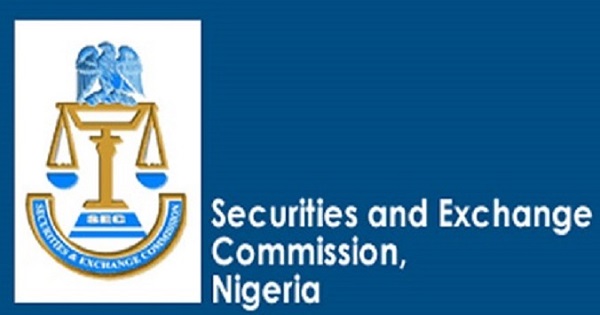E-Financial
SEC Mulls Rule Protect Investors, Stockbrokers from Risks, Losses

Securities and Exchange Commission (SEC) is proposing a new rule to look into the associated with stockbroking operations and protect investors in the event of the occurrence of the risk or loss insured.
In a disclosure, SEC said guideline, which will come under Rule 27A is mainly “to exempt capital market experts/professionals from maintaining fidelity bonds and enable the establishment of an insurance product for dealing members of securities exchanges to cover the risks associated with stockbroking operations and protect investors in the event of the occurrence of the risk or loss insured.”
The apex capital market regulator tagged the proposed rule as Insurance Policy for Corporate Bodies Licensed as a Dealing Member of a Securities Exchange.
In the existing Rule 27, which talks about Fidelity Bond, states that, “Every registered corporate body shall provide and maintain a bond which shall be issued by an insurance company acceptable to the Commission against theft/stealing, fraud or dishonesty, covering each officer, employee and sponsored individual of the company.”
But SEC wants this amended to “Every registered corporate body other than a corporate body licensed as a dealing member of a securities exchange and capital market experts/professionals shall provide and maintain a bond which shall be issued by an insurance company acceptable to the Commission against theft/stealing, fraud or dishonesty, covering each officer, employee and sponsored individual of the company.”
In the new rule, the agency is proposing that, “Every registered corporate body licensed as a dealing member of a securities exchange shall procure and maintain an insurance policy issued by an insurance company acceptable to the commission. The policy shall cover all aspects of the insured business activities and risks including but not limited to the following:
“(a) fidelity guarantee against theft/stealing, fraud or dishonesty, covering each officer, employee and sponsored individual of the company;
“(b) professional indemnity in respect of loss arising from any claim or claims for any act or omission or breach of duty by officer, employee and sponsored individual of the company;
“(c) directors liability in respect of claims against wrongful acts committed in the capacity of a director;
“(d) legal liability, or other third-party claim;
“(e) other risks associated with its products and services.
“Provided however that the insurance policy shall take into consideration the situation whereby the dealing member is a member of multiple securities exchanges.”
It is also considering a rule that will make “every corporate body licensed as a dealing member of a securities exchange shall procure and maintain an insurance policy which shall where applicable, as may be determined by a securities exchange, name the securities exchange’s investors’ protection fund as the co-insured.
“Payments from the policy shall be utilized by the securities exchange’s investors’ protection fund towards compensating investors who have suffered losses on their securities traded on a securities exchange from the occurrence of the risks covered by the insurance policy.
“Provided however that where the dealing member is a member of multiple exchanges, payment shall be made to the relevant securities exchange where the defalcation occurred.”
In addition, it is proposing that, “The insurance policy maintained by a dealing member of a securities exchange shall provide that payment under the insurance policy can be made directly to the:
“(a) securities exchange’s investors’ protection fund which shall compensate investors who have suffered losses or;
“(b) affected dealing member with the prior written consent of the securities exchange’s investors’ protection fund.”
“The insurance policy shall provide that it shall not be cancelled, terminated or modified by the dealing member of a securities exchange without the prior written consent of the securities exchange’s investors’ protection fund and the commission. Where the cancellation, termination or modification is at the instance of the insurance company such cancellation, termination or modification shall not be carried out except after written notice shall have been given by the insurance company to the commission and the securities exchange’s investors’ protection fund, not less than sixty (60) calendar days prior to the effective date of cancellation, termination or modification.
“The insurance policy shall be provided in such reasonable form, terms and under such premium as the fiduciary duties of the officer, employee or sponsored individual require, but with due consideration to all
relevant factors, including but not limited to the risks insured, products and services, clientele, the value of the aggregate assets of the dealing member of a securities exchange in relation to all its registered functions, to which any officer, employee or sponsored individual may have access, the type and terms of the arrangements made for the custody and safekeeping of assets and securities in the company’s portfolio,” it added.
“The insurance policy shall cover not less than 20% of the minimum paid up capital of the dealing member of a securities exchange.
“Every dealing member of a securities exchange shall file with the commission and the securities exchange:
“(a) a statement of the nature and value of a claim within five (5) business days after the making of any claim under the insurance policy; and
“(b) a copy of the terms of the settlement of any claim made under the insurance policy within five (5) business days of the receipt thereof.
“Every securities exchange on the advice of the securities exchange’s Investor Protection Fund (IPF) shall provide quarterly reports to the commission on all claims settled under the insurance policy, and the report shall include the name of the investor and the sum received under the insurance policy.”
E-Financial
Non-Resident Registration Pushes BVN Enrollments to 66.2m in July

Bank Verification Number (BVN) database rose to a new high in July 2025, with total enrollments climbing to 66.23 million, a 4.3 per cent increase within the first seven months of the year, as Nigerians residing outside the country enrolled through the Non-Resident BVN (NRBVN) initiative.

The Central Bank of Nigeria (CBN) had, earlier this year, introduced the NRBVN, alongside the Non-Resident Nigerian Ordinary Account (NRNOA) and the Non-Resident Nigerian Investment Account (NRNIA), to attract diaspora investments into the country.
Subsequently, commercial banks with international licences took up the challenge, launching roadshows to help Nigerians abroad open accounts and enrol in the biometric identity system.
This effort drove up the number of enrollments from the 63.48 million recorded as of December 2024.
According to the latest figures from the Nigeria Inter-Bank Settlement System (NIBSS), 2025 is shaping up to be one of the most active years for BVN registration since 2021.
Over the past four years, BVN growth has maintained a steady upward trend: from 51.9 million in 2021, enrollments rose by 7.9 per cent to 56 million in 2022, followed by a 7.4 per cent increase to 60.1 million in 2023.
Growth moderated slightly in 2024, with a 5.6 per cent rise, but the 4.3 per cent increase already recorded by mid-2025 suggests this year could surpass last year’s total by December.
The NRBVN enables Nigerians living abroad to enroll for BVNs remotely, eliminating the need to visit bank branches in Nigeria.
At a cost of $50, the initiative has significantly broadened the system’s reach and strengthened diaspora engagement with the country’s formal financial services.
The spike in non-resident enrollments has also been supported by stricter Know Your Customer (KYC) requirements across the banking sector and deeper collaboration with fintechs that streamline the onboarding process.
Together, these efforts have reinforced the BVN’s role as a cornerstone of digital identity and financial inclusion in Nigeria.
Alongside the rise in BVN registrations, the banking sector is witnessing increased account activity.
As of March 2025, the number of active bank accounts reached an all-time high of 320.053 million.
Dormant accounts stood at 33.4 million, while 29.4 million accounts had been closed.
This compares to slightly lower figures in February, which recorded 316.8 million active accounts, 19.9 million dormant accounts, and 33.3 million closures.
The rebound in March points to a growing number of Nigerians re-engaging with the formal banking system, aligning with broader efforts by financial institutions and regulators to promote access, trust, and compliance within the financial sector.
E-Financial
Zenith Bank rolls out drums for D’Tigress, rewards team with N200m

Zenith Bank Plc on Tuesday rewarded Nigeria’s senior women’s basketball team, D’Tigress, with ₦200 million for winning the 2025 FIBA Women’s AfroBasket Championship.

L-R: Executive Director, Mr. Henry Oroh; Executive Director; Mr. Louis Odom; D’Tigress Captain, Amy Okonkwo; President, NBBF, Engr. Musa Kida; Group Managing Director/ Chief Executive, Zenith Bank Plc., Dame (Dr.) Adaora Umeoji, OON; Head Coach, D’Tigress, Rena Wakama; Executive Director, Mrs. Adobi Nwapa and Executive Director, Mr. Akin Ogunranti during the reception hosted by Zenith Bank to celebrate D’Tigress’ 2025 Afrobasket Women’s Championship triumph in Abuja, yesterday.
The reception, held at the bank’s head office in Maitama, Abuja, was organised to honour the team for clinching a historic fifth consecutive AfroBasket title.
Each player is expected to receive ₦10 million, which will be paid into their Zenith Bank accounts, while the technical crew and other officials will share the balance.
D’Tigress defeated Mali 78–64 in the final played in Abidjan on Sunday. The team returned to Nigeria on Monday and was received by President Bola Tinubu, who conferred National Honours of Officer of the Order of the Niger (OON) on the players and gave them cash rewards.
Zenith Bank has sponsored the Women National Basketball League for 18 years, with several players and officials of the current team having passed through the league.
Among them are Murjanatu Musa, MVP of the Air Warriors team that won the 2022 league title, and Ifunnaya Okoro. The team’s head coach, Rena Wakama, also played in the league with First Bank Women Basketball Club.
Present at the reception were Zenith Bank Executive Directors Adobi Nwapa, Akin Ogunranti, Henry Oroh and Louis Odom.
Also in attendance were the Chairman of the National Sports Commission, Mallam Shehu Dikko, President of the Nigeria Basketball Federation (NBBF), Musa Kida, and other board members.
Speaking at the event, the Group Managing Director/Chief Executive Officer of Zenith Bank, Dame (Dr.) Adaora Umeoji, OON, commended the team for their performance and reaffirmed the bank’s commitment to supporting women’s basketball in Nigeria.
“Your victory at the 2025 FIBA Women’s AfroBasket is not just a win for Nigeria, it is a win for African sports,” she said.
Responding on behalf of the team, captain and tournament MVP, Amy Okonkwo, thanked Zenith Bank for its continued support for women’s basketball in the country.Zenith Bank Plc
E-Financial
SEC DG Warns as Crypto Adoption Rises in West Africa Without Proper Regulations

Dr. Emomotimi Agama, Director-General of the Securities and Exchange Commission (SEC) Nigeria, has said that West Africa is fast emerging as a global epicentre for virtual asset adoption, propelled by a young, tech-savvy population and macroeconomic instability.

Speaking at the West Africa Compliance Summit organised by the Inter-Governmental Action Group against Money Laundering in West Africa (GIABA) in Praia, Cape Verde, Dr. Agama warned that while the region’s embrace of digital currencies is accelerating, the absence of coordinated regulation leaves it vulnerable to financial crimes and illicit capital flows.
“With over 60 percent of West Africa’s population under the age of 25 and mobile-first fintech platforms thriving, the region has become a global hotspot for virtual asset adoption,” he said. “But we must act decisively. Regulation is not optional, it is an imperative.”
The summit, themed “Adapting and Thriving in a Complex and Evolving Compliance Landscape,” brought together financial regulators, compliance professionals, and security experts to explore the challenges posed by the rapid rise of virtual assets and decentralised finance (DeFi).
Dr. Agama disclosed that crypto transactions in Nigeria alone surpassed $56 billion in 2024, with citizens increasingly turning to stablecoins such as USDT and USDC to hedge against volatile local currencies. He highlighted the growing trend of “crypto-dollarisation,” noting that young professionals now demand salaries in stablecoins, while businesses are adopting platforms like Binance Pay for cross-border transactions.
“The naira’s depreciation, Ghana’s cedi weakness, and persistent forex shortages have fueled this shift,” he explained. “Traditional remittance channels charge up to 10 percent in fees, while cryptocurrencies offer faster and cheaper alternatives. Over $20 billion in remittances flowed into West Africa last year through crypto channels.”
However, he also cautioned that the same innovations driving financial efficiency are increasingly being exploited by fraudsters and criminal actors. He cited GIABA’s report of $2.1 billion in suspicious crypto-related transactions across West Africa in 2024 alone, including the use of privacy coins by terror financiers to evade detection.
“Unregulated exchanges, artificial market crashes, DeFi ‘rug pulls,’ and Ponzi schemes have wiped out billions in investor funds,” he said. “The recent collapse of the CBEX Ponzi platform is just one of many such incidents. Strong regulation and regional coordination are the only path forward.”
Dr. Agama pointed to Nigeria’s recent legislative progress, especially the enactment of the Investment and Securities Act 2025, which formally classifies virtual assets—including cryptocurrencies, stablecoins, utility tokens, and NFTs—as securities under Section 355(4) and Part I of the Second Schedule.
“Under the new law, all exchanges, wallets, and DeFi platforms must be licensed by the SEC,” he stated. “We’ve also established a Fintech and Innovation Department to facilitate ongoing dialogue with industry stakeholders and adapt our regulations to emerging realities.”
He called on West African governments to harmonise regulatory frameworks and strengthen intelligence-sharing, proposing a Unified Virtual Asset Service Provider (VASP) Licensing System under the ECOWAS framework.
“A crypto trader banned in Nigeria should not find safe haven in Ghana,” he asserted. “Financial crime knows no borders. Our collective future depends on our ability to secure this emerging financial frontier.”

 Telecom2 days ago
Telecom2 days agoNCC to Sanction Operators over Regulatory Violations

 General News2 days ago
General News2 days agoCustoms Ditches Fast Track Scheme for Authorised Economic Operator

 News2 days ago
News2 days agoFG to Move 5m Homes to Clean Cooking by 2030 — Minister

 Telecom2 days ago
Telecom2 days agoAirtel Africa Signs Multi-year Strategic Partnership with Xtelify

 E-Financial2 days ago
E-Financial2 days agoSEC DG Warns as Crypto Adoption Rises in West Africa Without Proper Regulations

 E-Business1 day ago
E-Business1 day agoReport Reveals Over Half of Security Experts Overwhelmed Managing Cybersecurity Tools from Multiple Vendors

 E-Financial2 days ago
E-Financial2 days agoNOVA Bank Deepens Market Presence with New Branches and Regional Focus

 Telecom1 day ago
Telecom1 day agoMTN & Ultima Studios Kick Off Hunt for Nigeria’s Next Afrobeats Icon



























